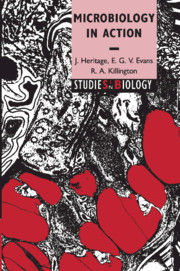Book contents
- Frontmatter
- Contents
- Preface
- 1 The microbiology of soil and of nutrient cycling
- 2 Plant–microbe interactions
- 3 The microbiology of drinking water
- 4 Microbial products
- 5 Food microbiology
- 6 The human commensal flora
- 7 Microbial infections
- 8 Chemotherapy and antibiotic resistance
- Further reading
- Glossary
- Index
8 - Chemotherapy and antibiotic resistance
Published online by Cambridge University Press: 05 June 2012
- Frontmatter
- Contents
- Preface
- 1 The microbiology of soil and of nutrient cycling
- 2 Plant–microbe interactions
- 3 The microbiology of drinking water
- 4 Microbial products
- 5 Food microbiology
- 6 The human commensal flora
- 7 Microbial infections
- 8 Chemotherapy and antibiotic resistance
- Further reading
- Glossary
- Index
Summary
One of the greatest triumphs of modern medicine has been the introduction of a rational system of antimicrobial chemotherapy to combat infectious diseases. Since time immemorial, folk remedies have exploited moulds or mould extracts to treat infections. In the early days of microbiology, attempts were made to use extracts derived from fungal cultures to prevent surgical wound infection. Joseph Lister used cultures of his own urine to investigate the microbiology of air. He noted that if moulds were present in his cultures, the bacteria that were also there appeared non-motile and degenerate, whereas if bacteria grew without moulds, they were highly motile. Lister concluded that moulds produced a substance or substances that adversely affected the viability of bacteria. He then reasoned that culture filtrates obtained from moulds should prevent infection if used to irrigate surgical wounds. This practice started 60 years before Alexander Fleming described the antibacterial properties of penicillin, produced from a mould that he had originally misidentified.
The problem of producing sufficient antibiotic from mould cultures defeated both Lister and Fleming. Indeed, Fleming was slow to appreciate the clinical applications of his observations. He intended that penicillin should be used as a selective agent in laboratory media rather than to be administered to patients directly. It was not until the early days of the Second World War that an allied Anglo-American effort overcame the problem of large-scale production and penicillin therapy for human infection was properly initiated.
- Type
- Chapter
- Information
- Microbiology in Action , pp. 249 - 266Publisher: Cambridge University PressPrint publication year: 1999

